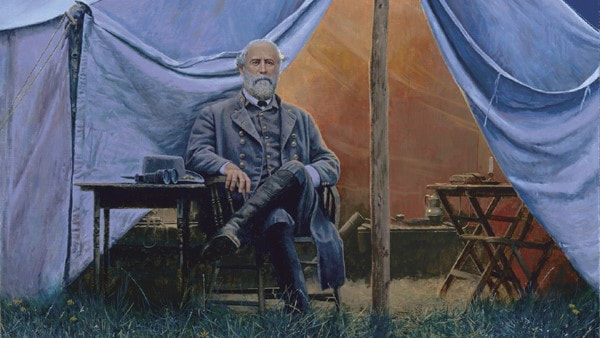|
Although it sounds extreme and unattainable, the elimination of Whiteness must be taken seriously. Western Civilization, a creation of Whiteness, is losing its influence on society. White heroes of past generations are being eradicated by a process known as “presentism.” The term “presentism” means judging persons and events of the past using today’s standards. It is often used to disparage heroes of past generations whose values are no longer compatible with contemporary attitudes. Our heritage is currently being maligned by non-White groups who have altered the composition of our society. After only two decades into the 21st century, important aspects of our culture have been lost to heritage cleansing. A prominent victim of heritage cleansing is Robert E. Lee, one of our most celebrated heroes and a member of one of our most distinguished families - the Lee family of Virginia. Although originally a Confederate hero, Lee has been honored in all sections of our country. During the century and a half since his death, there have been monuments, street names, school names and other tributes to Lee. On the wall of his office, President Eisenhower had pictures of his four most famous Americans. Benjamin Franklin, George Washington, Abraham Lincoln, and Robert E. Lee. Theodore Roosevelt characterized Lee as “the very greatest of all the great captains that the English-speaking peoples have brought forth.” Franklin Roosevelt praised Robert E. Lee as “one of our greatest American Christians and one of our greatest American gentlemen.” President Truman gave his mother a gift of a portrait of General Lee. In Great Britain, Winston Churchill wrote that Lee was “one of the noblest Americans who ever lived, and one of the greatest captains in the annals of war.” Unfortunately, what many Americans of this generation know about Robert E. Lee comes from surfing online websites. These websites tend to report history selectively and avoid complex issues. Some sites assert that Robert E. Lee committed treason against his nation. But in 1860 there were only 33 states, the majority located east of the Mississippi River. People rarely relocated to other states and loyalty to one’s state took precedence over loyalty to the regime in Washington. This was the socio/political environment that shaped Robert E. Lee and should be used to evaluate him. Each generation thinks it has the final answers to society’s problems but its solutions are often altered in succeeding generations. In this Woke generation, we have a coterie of ideologues and malcontents who are eliminating aspects of our heritage because they feel it is outdated. Robert E. Lee is dismissed as a product of 19th century values that are out-of-step with 21st century values. The Woke generation approves of the removal of Lee monuments because they offend minorities. Virginia’s racially tainted Governor Ralph Northam removed the renowned equestrian statue honoring General Robert E. Lee on Richmond’s famous Monument Avenue. Removal of this 130 year old, 12 ton, 60 foot tall General Lee monument, the largest in the South, clears Monument Avenue of all of its Confederate memorials. Demagogic Governor Northam ignored an opinion poll indicating that Virginia was evenly divided on the question of removing Confederate memorials. Instead, he relied on the hyped, overworked term ‘racial justice’ to rationalize his eradication of the celebrated Lee statue. The Lee monument had been a target of cancel culture for some time. Lee supporters hoped that a push-back would develop and save the monument. That push-back has never developed. But, despite the censure of Wokes and elites, the monument remained resilient. Interestingly, what finally brought it down were protests following the death of Black shoplifter George Floyd, who died while being restrained by White police in Minnesota. The phenomenon of Robert E. Lee is unparalleled in history. Although his side lost the War, his military prowess was praised. Curiously he was celebrated by both the losing side and the wining side. After the War, even though he led a quiet, unpretentious life, Lee became an American icon. Robert E. Lee’s monuments were unharmed until 21st century rage mobs began eliminating White culture. During the last five years over 100 monuments have been removed. Protesting crowds tried but couldn’t prevent those removals. A growing sense of loss over the removal of Lee memorials could precipitate some kind of recovery effort. I’m hopeful, but not optimistic.
1 Comment
For roughly the last half-century, history reporting has been seriously politicized. Politicized historians make no attempt to be impartial and they interpret the past in the way that best accommodates the present. Also they don’t view America favorably and tend to make racism our most significant problem. And, of course, they claim slavery was the sole cause of the Civil War. It might be informative to scrutinize a typical politicized historian. A classic example is media favorite Karen Cox, professor of history at the University of North Carolina at Charlotte. Her trendy, partisan versions of history and culture are exactly what the establishment wants to read. The establishment’s villains and heroes are also hers. Cox’s primary villain is the antebellum South which she excoriates for its use of slaves. Cox holds the South alone responsible for American slavery and insists that Southern heritage shouldn’t be celebrated. For her, Confederate memorials are simply reminders of the Jim Crow era and lynchings. She states; “People do not want to see the connection between the Jim Crow period and these monuments,” But, Cox claims, an increase in Confederate monuments parallels an increase in lynchings. Yes, you read that correctly. Confederate memorials do not honor heroes but inspire lynchings. Actually, Karen Cox’s histories are little more than propaganda. She compares Donald Trump with Robert E. Lee, maintaining that both failed and both did more harm than good. Furthermore, Cox claims that Trump, like Lee, pursued a “lost cause”, undermining the Constitution as Lee tried to undermine the Union. Generally, ‘lost cause’ implies an immoral South rationalizing its capitulation to a righteous Northeast in a War fought solely to end slavery. But professor Cox and her ilk use the worn-out pejorative term ‘lost cause’ rather loosely. War was declared to prevent Southern secession and “save the Union” not to end Southern slavery. Funds provided by slave-grown cotton and Southern tariffs were a needed source of revenue for Lincoln’s government. Lincoln didn’t want large plantations in the territories because they would compete with small farming families relocating from the industrializing Northeast. This was an economic reason rather than a moral one. Ending Southern slavery didn’t become a cause of the War until Lincoln feared Great Britain and other European countries might assist the Confederate War effort. Karen Cox’s histories avoid complex issues, focusing instead on what sustains contemporary social concerns. She makes little or no mention of the Northeast’s involvement in the slave trade nor its financing of plantations in the largely agricultural South. Also, she doesn’t mention how slave-grown cotton created the North’s economy or how the majority of profits from slave-grown cotton ended up in Northern pockets. As a Feminist, Cox claims: “Some of the best historians working today are women and people of color.” Although she claims that Blacks and women are the best historians, she doesn’t include women members of the United Daughters of the Confederacy. The UDC’s versions of history don’t fit her narrative. Ranking women and people of color as better historians than White males is fairly typical of Woke culture. In past decades, when Americans got their information from print media rather than electronic media, Karen Cox couldn’t have become a historian. Actually, she is more a media celebrity than a historian and its her support of contemporary political opinions that is favored, not her scholarship. I, like many others, have reservations about the veracity of her histories and I resent her over-simplified, disparaging depictions of the antebellum South. Her histories are little more than proselytizing and will probably not stand the test of time. |
AuthorGail Jarvis is a Georgia-based free-lance writer. He attended the University of Alabama and has a degree from Birmingham Southern College. His writing is influenced by years of witnessing how versions of news and history were distorted for political reasons. Mr. Jarvis is a member of the Society of Independent Southern Historians and his articles have appeared on various websites, magazines, and publications for several organizations. He lives in Coastal Georgia. Archives
June 2023
|


